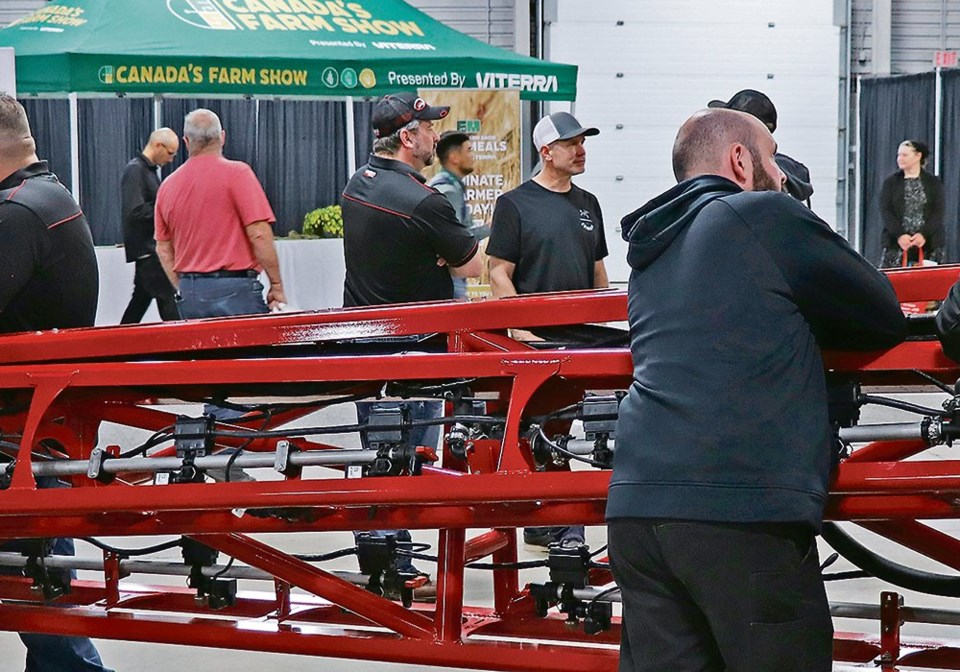REGINA — A Nigerian farmer attended Regina show looking for livestock handling equipment and says he made valuable contacts
Canada’s Farm Show returned last week with a new footprint and strong attendance after a COVID-19 induced hiatus of about 1,100 days.
Organizers of the show said opening day attendance was about 18 percent higher than the first day of the 2019 show, the last to be held in person before the pandemic.
Tim Reid, chief executive officer of the host Regina Exhibition Association Limited (REAL) District, said he expected about 30,000 people would attend, including delegations from 55 countries.
A final attendance tally was expected June 28.
The 2022 show moved entirely indoors on the REAL grounds in Regina for the first time. That meant the usual weather woes that plagued outdoor exhibitors were not a factor.
Show chair Shirley Janezcko said exhibitor feedback was positive about both being inside and the traffic.
Soji Iyalla, representing a farm in Nigeria, attended the show for the first time and said he will be back for Canadian Western Agribition in the fall.
He formerly worked in the oil and gas sector and said he had been to Calgary many times since 2008. At the farm show he was mainly looking for livestock-handling equipment.
“Food production and food security is a big issue in Nigeria vis a vis our population. It’s very important that we are self-sufficient in food production,” he said. “Where else can we come to if not Canada? And if you’re talking about Canada where else can we come to if not Saskatchewan? And then where else in Saskatchewan if not Regina? That’s why we’re here.”
Iyalla said he farms in the southern part of Nigeria where there is a greater focus on livestock, chicken and fish. Crops are planted year-round there.
In Regina, he said he met with Hi-Hog Farm and Ranch Equipment.
“We’re looking forward to a beautiful partnership,” he said.
He added that Canadian equipment is top-quality and competitively priced. That’s why the small delegation of three made a three-day trip to get to the show.
It will be another long trip to come back in November to purchase cattle.
Also coming from a long way was a delegation of 14 farmers from Mongolia.
Boldsaihkan Usukh from Ensada Holding Co. in Ulaanbaatar is familiar with Saskatchewan agriculture as he obtained his master’s degree in agriculture from the University of Saskatchewan.
“Back in our country in Mongolia it’s the other side of the world and we are trying to change our conventional farming practices to no-till technology, that’s why we want to see on site in Saskatchewan,” he said. “Saskatchewan is the most famous farm equipment manufacturer in the world.”
The delegation signed contracts with Bourgault and was interested in SeedMaster as well. After the show they were to visit the New Holland Flexi-Coil factory in Saskatoon to perhaps buy more.
Usukh said a mid-size farm in Mongolia is about 12,300 acres. He and his partners have 49,000 acres. Ensada is also a Case New Holland dealership that partners with several Canadian companies.
He said smaller farmers are consolidating and co-operating and the largest enterprise is 370,000 acres.
He said the delegation had visited a large farm near Regina with 70,000 acres to see the farming practices on larger acreages.
Mongolia is at the same latitude as Saskatchewan, with similar soils and climate.
Usukh said farmers there used to buy equipment from Russia and Belarus but need to move to no-till.
“Our research says Bourgault is number one in the world,” he said, adding the SeedMaster reviews were also good.
In the last 10 years, Usukh has sold 75 Saskatchewan-made air drills to Mongolians but he said more equipment is required.
Usukh and Iyalla said the war in Ukraine has affected them.
Mongolia is located between China and Russia. Input prices have risen sharply, which is jeopardizing food security.
Usukh said his government has proclaimed 2022 the year of food security in Mongolia and offered farmers subsidies to buy equipment. Mongolian farmers focus on wheat and canola and supplying domestic needs.
“Sometimes in a very dry year we buy some grain from Russia but nowadays we don’t want to buy from there,” he said.
Iyalla said with 250 million people in Nigeria, food supply cannot be overemphasized. He said most of the production of crops like sorghum, millet and beans is in northern Nigeria, but it isn’t enough to supply all the need, so wheat and flour imports from Ukraine are common.
“The war in Ukraine has truly affected food supply from outside the country into Nigeria,” he said.

